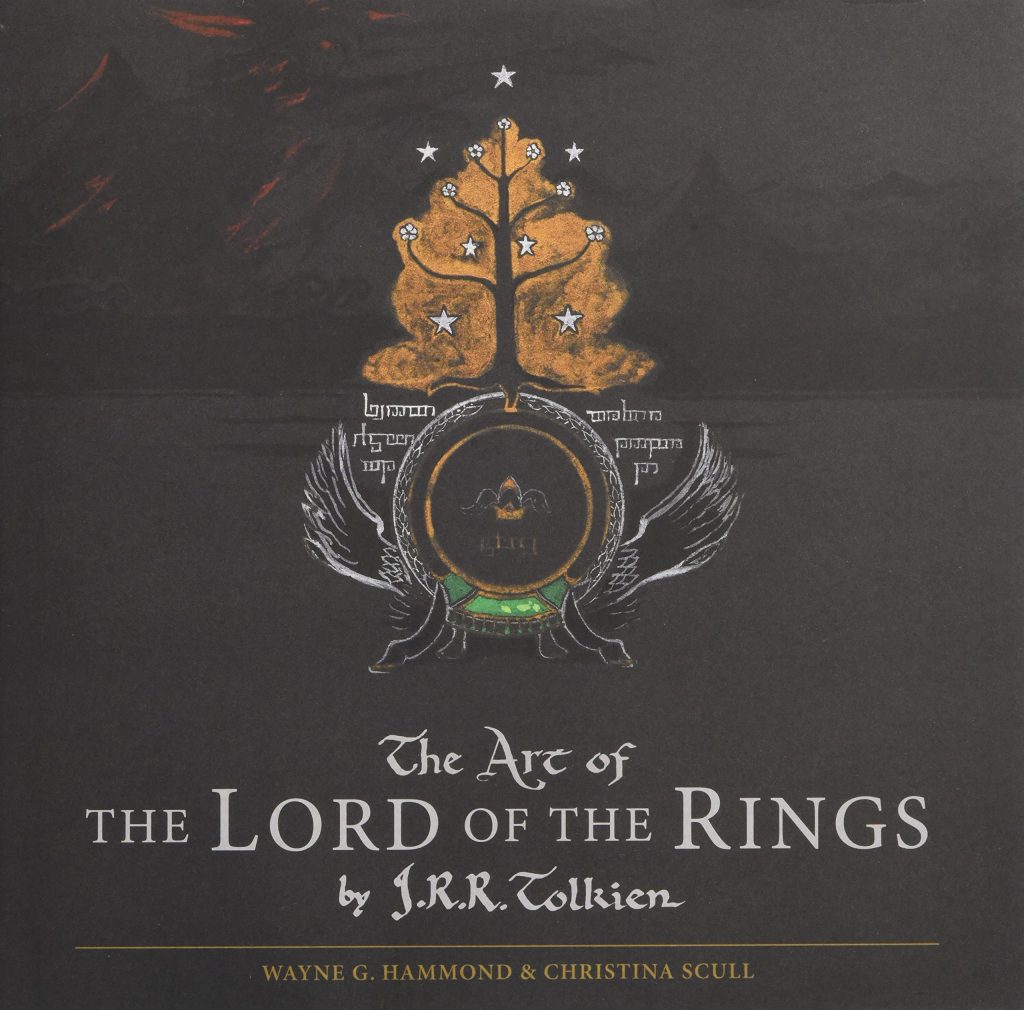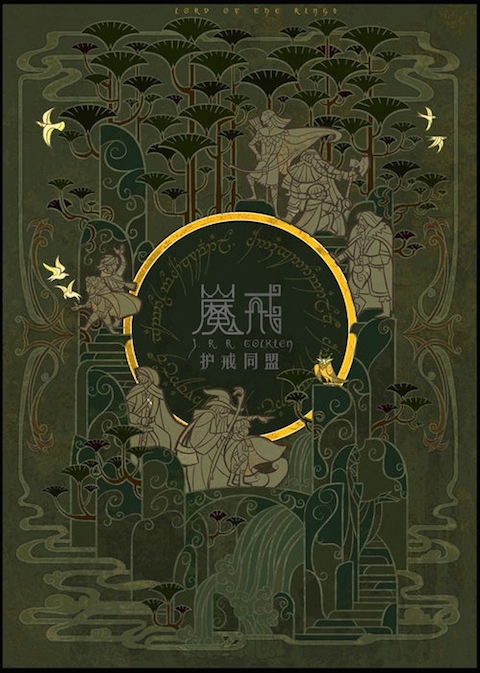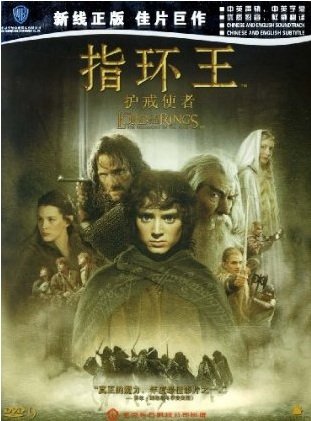Guest writer Matthew Bossons brings us this fascinating look at how Tolkien fandom has made its way to China; and he reflects on whether Amazon’s upcoming Middle-earth series is likely to find fans there.
Panjiayuan is Beijing’s biggest and best-known antique market, regularly attracting orc-like hordes of tourists and locals alike to wander the warren of booths and stalls, both indoor and outside. All manner of old and made-to-look-old items are on offer here: jade carvings, stone Buddha statues, ancient coins, Chinese Communist Party pins and propaganda posters, replica Korean war medals and mounds of books.
On a brisk October day, while standing at a hawker stand specializing in old Chinese books – mostly Chairman Mao’s iconic ‘Little Red Book’ – I came across a curious title: The Art of The Lord of the Rings by J.R.R. Tolkien, in English-language and hardcover form. The book, a collection of sketches and maps made by Tolkien, was published in 2015 and compiled by Wayne G. Hammond and Christina Scull – both well-known scholars of the ‘father of high fantasy.’

While there is no shortage of English-language books and magazines lying around Panjiayuan, this one caught my eye. A short time and a few stalls later and I came across a shoebox filled to the brim with old, Chinese-language Magic: The Gathering cards. (For the uninitiated, Magic: The Gathering is a fantasy card game that sometimes draws inspiration from the beings and beasts of Middle-earth. Some fans of the game have even created playing decks inspired by Tolkien’s work.)
The two finds got me thinking: How and when did Tolkien’s work arrive in China, and does China have a Tolkien fanbase as rabid and passionate as that in the West?
The Ring Goes East
In a broad sense, fantasy is nothing new in China: In the 16th century, during the Ming Dynasty, the classic Chinese novel Journey to the West was published. The story, which chronicles the adventures of a Buddhist monk who travels to India to recover Buddhist scriptures, features numerous magical beings – most notably the Monkey King, Sun Wukong.
But The Lord of the Rings and The Hobbit are different. For one, they are Europe-centric, with the author drawing inspiration from European folklore and fairy tales, religion (primarily Roman Catholicism) and language. His experiences in war-torn Europe during World War I also influenced elements of his Middle-earth legendarium. Characteristics of East Asian folklore, religion (Buddhism, Taoism, Confucianism, etc.) and language are notably absent from Tolkien’s work, which means that an approachable cultural entry point can be challenging to find for prospective Chinese readers.
Originally published way back in 1954-55, Tolkien’s trilogy was released when the People’s Republic of China (PRC) was mostly closed off to the world. Revolutionary Mao Zedong and the Communist Party of China had risen to power only a half-decade prior to the release of The Fellowship of the Ring, and land reforms and collectivization were underway. Only a trickle of foreign media made its way into the country at that time, most of it of the ideologically-aligned and Soviet variety.
The greatest hindrance for Tolkien’s masterpieces in China, though, was the lack of a Chinese-language translation of The Lord of the Rings and The Hobbit. This impediment wouldn’t be overcome until 1998 when the Wanxiang and Lianjing publishing companies in Taiwan released two versions of The Lord of the Rings translated into traditional Chinese characters.
Since then, several more versions of Tolkien’s three-part epic have been translated to both traditional and simplified Chinese characters, along with some of his other stories, including The Adventures of Tom Bombadil and Other Verses from the Red Book, Roverandom, Leaf by Niggle, The Silmarillion and, of course, The Hobbit. Many other stories have not been officially translated, though.
Still, many of the Chinese-language translations of Tolkien’s three-volume epic have suffered due to the lack of cultural context mentioned above.
A thesis paper written in 2000 by a student at Fu Jen Catholic University in Taiwan analyzed the various translation issues present in the first Chinese-language versions of The Lord of the Rings published two years earlier. The author David van der Peet notes that both versions include a myriad of translation gaffes and fail to convey the original meaning of Tolkien’s text. He attributes these shortcomings to the translators’ lack of knowledge of “the complicated linguistic and cultural backdrop” that frames the trilogy.
Later translations suffered from similar criticisms.
Of the numerous The Lord of the Rings Chinese-language translations, the work of Taiwan resident Teng Jia-wan stands out. Teng first got acquainted with the fantasy trilogy while studying at a British university in the late 1990s, according to a 2018 China Daily profile. She felt so enchanted by the novels that she decided she would translate them into Chinese.
Unfortunately, Teng was a little late to the party, and the abovementioned Chinese-language versions of The Lord of the Rings already existed. So, after returning to Taiwan in 1998, she set about translating The Silmarillion instead. Her version was published in Taiwan in 2002 and spread online in the Chinese mainland – since there was no official print version.
Teng’s dream to translate and publish a Chinese version of The Lord of the Rings would eventually come true, though: In 2012, she was tapped to translate a new version of the iconic trilogy along with two other Chinese Tolkien fans she met through online forums. The finished product was published in 2013 and has been hailed by some as the most accurate translation of the story of the quest to destroy the One Ring.

Out of the Wok and Into the Fires of Fandom
While the success of Peter Jackson’s three-part film adaptation of The Lord of the Rings was practically guaranteed in the Western world, there were no promises it would be a shoo-in blockbuster in the PRC. (If you don’t believe me, look no further than the Star Wars films for an example of popular Western media that has consistently bombed on the Chinese mainland.)
Despite the obstacles to the success of the story of Frodo and the Ring of Power in the Chinese market, Jackson’s films would find a reason to celebrate in China.
Chicago-based physicist and writer Dr. Yangyang Cheng recounted the fanfare around the launch of The Fellowship of the Ring in China in a recently published essay in SupChina. Dr. Cheng, 31, grew up in a medium-sized city in Central China and was first introduced to Tolkien’s work when her mother brought home a Chinese-language collection of classic Western stories. The abridged versions of The Hobbit and The Lord of the Rings were her favorites.
Asked about the hype for the film adaptation of Fellowship, Dr. Cheng tells me via email that “posters and billboards for the movies were everywhere in the city and my classmates and I talked about it often at school.”
In her SupChina essay, she also notes that Chinese-language adaptations of the books were soon prominently featured in every bookstore. China’s once-ubiquitous roadside DVD hawkers began offering copies of Jackson’s films with “dubious licensing.”
In 2004, Jackson’s The Return of the King became the top film at the Chinese box office – a massive achievement.
The debut of The Lord of the Rings films in China led to an increase in Tolkien-related media in the PRC, and soon a large number of citizens were at the very least familiar with the writer’s stories.

A decade after the last film in Jackon’s first trilogy was released, when the filmmaker’s comparatively lackluster conclusion to the three-part film adaptation of The Hobbit hit silver screens, it was the Chinese market that helped it rake in the dragon’s hoard. On its opening weekend in China, The Hobbit: The Battle of the Five Armies brought in a record-breaking US$49.5 million.
According to a Vanity Fair article from early 2015, “[E]ven though it did pretty well domestically, the Hobbit trilogy didn’t end up being quite the box office titan Lord of the Rings was back in the pre-Marvel era of 2003. That is, until today. The Hobbit: The Battle of the Five Armies premiered in China this weekend to a record-breaking $49.5 million, bringing its worldwide revenue to $866.5 million. Even greedy Smaug might be happy with that.”
From no Tolkien to translated Tolkien to Jackson’s impressive cinematic adaptations, The Lord of the Rings found its way into China’s public consciousness. Heck, the fantasy novels and films have proven so popular in China that a company constructed a One Ring-inspired skyscraper in 2019 in Southwest China’s Chongqing municipality.
Amazon’s Gate Opens
As I write this article in 2021, global Tolkien fandom collectively smashes their fingers against screens and keyboards, hunting for the latest details of Amazon’s massive-budget TV series set in Middle-earth’s Second Age.
I wonder: How will the upcoming Tolkien-inspired Amazon series be received in China?
“I think The Lord of the Rings has a really great reputation in China. I feel like it is honestly one of those works of Western literature that is most accessible to the average Chinese person. I think [the Amazon Prime adaptation] will do well,” says Bryan Grogan, the culture editor at Shanghai-based digital publication Radii China.
While it’s difficult to say with certainty, I’m of the belief The Lord of the Rings TV program will likely find a ready and welcoming fan base in the PRC. For one, the super-high-budget series will presumably benefit from Chinese audiences’ familiarity with Tolkien’s literature and Jackson’s films.
The TV show also stands a strong chance of stepping into the void left when HBO’s mega-hit series Game of Thrones wrapped up in 2019. Game of Thrones proved incredibly popular in China, with Chinese President Xi Jinping even believed to have referenced the show during an official meeting on at least one occasion.
In addition to being namedropped by the world’s most powerful Chinese man, the fantasy series truly connected with Chinese fans. Considerable online chatter preceded and followed each new Game of Thrones episode (in the later seasons, anyway) on China’s Twitter-like microblog platform Weibo. Some fans even got creative: One netizen created a viral series of Photoshopped images featuring characters from Westeros as Chinese street vendors and New Year’s travelers.
A 2017 article in The Diplomat even suggests that Game of Thrones led to an increase in tourists from China to places like Croatia and Ireland, where parts of the HBO series were filmed.
“I’m interested to see if [Amazon’s The Lord of the Rings] gets released in China and how it gets released in China. I wonder, being from Amazon, who they would want to partner up with as a domestic streaming partner […] and whether it’s allowed to stream in China,” Grogan tells me. “I think it was the last episode of Game of Thrones that was taken off Tencent or was not shown on Tencent, which caused a certain amount of controversy and unhappiness with fans of the series.” (Tencent Video is a popular video streaming platform in China.)
Grogan adds that it’s still kind of unclear why the final episode of the popular fantasy series was unavailable in China but that its content may have caught the attention of censorship authorities for its depiction of a monarch’s murder and the change of power.
As few plot details of Amazon’s upcoming The Lord of the Rings series have been made public, it’s presently difficult to say whether the series has story elements that may displease China’s censorship officials.
That said, if Amazon’s adventure in Middle-earth can partner with a PRC-based streamer and get past the country’s rigged censorship rules, I’m confident that it will find welcoming fans. Grogan agrees, telling me, “If it happens to make it to China, chances are it will be pretty popular.”
This is a guest article for TheOneRing.net, and is in no way affiliated with the website. The opinions expressed therein do not reflect those of TheOneRing.net.


